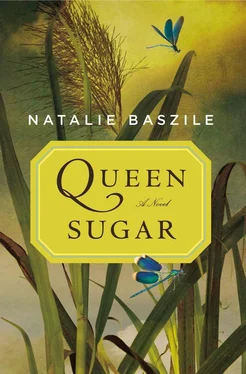“Did you find it?”
“No.”
Micah stayed tucked.
“Come on,” Charley said, and rested her hand lightly on Micah’s back.
For a while they drove in silence. Gathering clouds cast shadows over the cane, and Micah, back in the passenger seat, sat with her head against the door, her eyes closed although Charley knew she wasn’t sleeping.
“Mom?” Micah said, finally. She rubbed her own index finger. “I’m sorry.”
• • •
Later that evening, Charley surveyed the bedroom, which wasn’t much bigger than a pantry and felt even smaller with the double bed, their suitcases, and everything else they brought with them stuffed in Hefty bags dumped in the middle of the floor.
Micah flipped the switch, the motor kicked in, and the new air mattress they purchased from Fred’s crackled to life and inflated in slow motion. When it was full, Micah said, “I’m going to find Miss Honey,” and stepped across the mattress, bouncing like the first girl on the moon.
“Not too long,” Charley said. “It’s getting late.”
Just over the threshold, Micah turned. “Mom, I’m really sorry about your ring.”
“Me too.”
“And Mom?”
“What?”
“You’re not a fish.”
In a moment, the screen door slammed, then slammed again. Charley pulled the curtain and saw the two of them on the swing — Miss Honey in her housedress and slippers, and Micah, snug beside her. In a few minutes, Micah’s hair was loose and Miss Honey was brushing it — long strokes and quick gathering. There was a rhythm to it, and watching, Charley remembered the feel of Miss Honey’s hands in her own hair all those years ago, the smell of Miss Honey’s talcum powder, Cashmere Bouquet, which smelled of wood, and roses and maraschino cherries. She knew exactly how Micah felt. Charley watched awhile longer, then let the curtain fall. She wished she’d caught Micah by the elbow and pulled her close before she left the room. Wished she’d been able to say, I’m sorry. I won’t fail you twice.
Charley’s workshop — two thousand square feet of corrugated steel — sat on a patch of cleared ground just off the road that separated her north and south fields. An old John Deere tractor with a blown-out windshield and weeds twisting though the fender hulked out front. Rust-pocked chemical drums and stacks of cracked tires littered the side yard. The place had a postapocalyptic feel. It was a miracle the shop hadn’t been bulldozed and hauled to the scrap yard. Inside, under brittle fluorescent lights, it was cool, a nice break from the heat, but the air reeked of diesel fuel with bitter undertones of dried grass and the slightly acrid scent of rat droppings.
In the tiny office, Charley sat at a desk piled high with farm bulletins and equipment manuals. She sorted through folders brimming with crumpled receipts and unpaid invoices. How Frasier managed to hold this ship together as long as he did was a mystery, Charley thought, and she guessed his departure was a small blessing. But she didn’t know what half the bills were for, and even if she could identify the purchases, she couldn’t find them in the shop.
“What the hell’s Paraquat?” Charley said out loud. She balled the receipt and tossed it to the floor.
Around eleven o’clock, a sleek sedan with tinted windows and gleaming tires cruised up and parked. Charley heard the ping, ping, ping as the driver’s door opened, and she was just stepping out of the office as a smooth-looking white man in crisp pale clothing rapped on the shop’s metal door.
“Good morning,” Charley said. “Can I help you?”
“Welcome to Saint Josephine, Miss Bordelon.” He flashed a country-club smile and offered his hand, which sported a gold chunk of a class ring, then pulled a business card from his breast pocket. “I’m Jacques Landry.”
“‘Saint Mary’s Sugar Cooperative,’” Charley read. She had driven past Saint Mary’s sugar mill on her way to her farm and seen the original brick smokestacks draped with kudzu and the new, gleaming sugar warehouse. But other than noting that the air around Saint Mary’s always smelled like malt balls, Charley hadn’t paid much attention. She invited him in.
“So, you’re the lucky owner of LeJeune’s plantation,” Landry said. “Congratulations. That’s some fine land you’ve got out there.” Landry was handsome the way a Chris-Craft motorboat was handsome — all good lines and varnished teak.
“Thank you,” Charley said. “It’s very — exciting.”
“You’re the name on everyone’s lips,” Landry said. He looked around the shop with bright-eyed interest, as if paintings, not tools, hung on the pegboard. “Miss Honey’s granddaughter, all the way from Los Angeles to rescue LeJeune’s plantation from ruin.”
Landry was charming. The longer they talked, the more Charley felt like she was at a cocktail party. He laughed, asked her where she’d gone to college, what she’d majored in, when she’d married Davis, and what her mother did for a living. Slowly, it occurred to Charley that he was asking all the questions, and that she, tired of feeling desperate and alone on a sinking ship, was happy to answer him.
“So, how are things going for you, Miss Bordelon?” Landry sat on an arm of the beat-up couch and picked up an invoice, which Charley suddenly wanted to snatch back. “You doing all right? Have everything you need?”
No, she wanted to say. She had nothing. Please help. But she had already said too much: mentioned her student loans, her daughter’s name and age. Landry was grilling her, wasn’t he? And she had missed all the cues. “Why do you ask?”
“It’s pretty quiet around here,” Landry said, shrugging. “Sort of unusual this time of year. Most farmers are out cultivating their fields but it looks like you’re barely finished laying-by.” He sat with one foot crossed over the opposite knee, like a CEO in a boardroom, and now he wiggled his foot casually. “I noticed you’ve got some water hung up out near the back quadrant. Should probably get that pumped out soon. But listen to me, making suggestions. You probably know that already.”
“You’ve been out in my fields?” Charley said.
“Took a little drive.”
“Yes, well. I’ve had a few setbacks.”
Landry picked up another invoice and scanned it. “Wayne Frasier. Yeah, I heard about that. Tough break.”
“But I’ll be fine,” Charley said. “I’ve got some good leads.”
Landry looked skeptical, but said, “I’m glad to hear it. Good people are hard to find, as I’m sure you know.” He put the invoice down and stood.
“Is there something I can do for you?”
“No. I was just passing by. Saw your car out front, thought I’d stop in, see how you were doing.” He scanned the shop once more, then turned to Charley with a broad grin. “I remember when old man LeJeune was still alive. Talk about a man who was suited to this business. Folks used to say he had cane syrup in his veins. I tell you, he poured his heart into this operation. Shame his kids didn’t take better care of it.”
“You’re right,” Charley said. She walked toward the metal door and slid it open.
“He had this car,” Landry said, like a stand-up comedian about to deliver the punch line. “Great big Lincoln Continental. Had his man wash and wax it every Saturday. But would you believe he hardly drove it? Afternoons, rain or shine, right up till he got sick, he rode out to his fields on the back of a fifteen-hand Tennessee Walker.” Landry sighed, almost dreamily. “I guess some people prefer the old ways.”
His man , Charley thought.
“Thanks for stopping by,” Charley said in what she hoped was a dry tone, and slid the metal door wider.
Читать дальше












